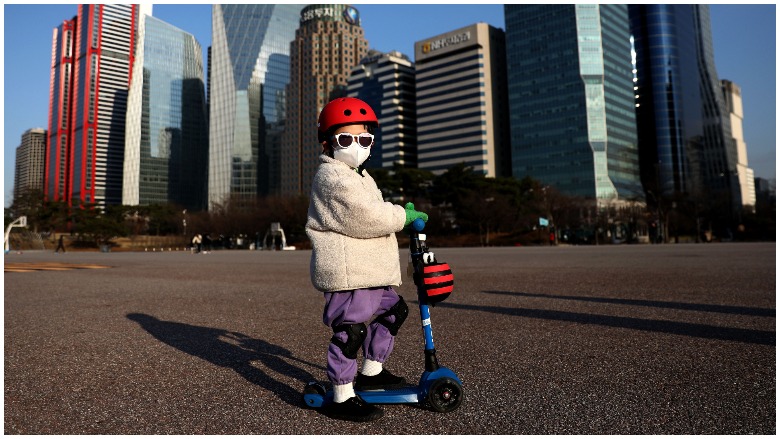
Getty The disease can be deadly for children.
As some schools reopen around the country, parents may be eying their children closer than ever to watch for signs of coronavirus infection. Although fewer children than adults are struck with the disease, children who get sick with COVID-19 can sometimes develop other conditions.
One of those is multisystem inflammatory syndrome, which affects the vital organs and can cause permanent damage or in some cases, death.
The United Kingdom was the first country to begin seeing children with coronavirus and severely inflamed organs in April of 2020; since then, a Health Alert from the Centers for Disease Control and Prevention (CDC) was issued to warn the international medical community.
As recently as Aug. 10, the Louisiana Health Department reported that four deaths of young people between the ages of 2 and 19 were attributable to MIS-C, KATC-3 reported, and those deaths were of the 44 total cases that were reported to the agency.
What Is Multisystem Inflammatory Syndrome?
MIS-C, or multisystem inflammatory syndrome, causes certain organs, such as the heart, kidneys, brain, skin and others, to swell, according to the Mayo Clinic.
The CDC reported that signs and symptoms of MIS-C include fever, vomiting, diarrhea, abdominal or neck pain, skin rash, red eyes and unusual tiredness (the Mayo Clinic also had lip and tongue redness/swelling and hand or foot redness/swelling on its list).
Doctors also warned that it can be easy to confuse MIS-C with Kawasaki disease, which inflames and swells blood vessels throughout the body of children, according to Nationwide Children’s; those children are typically 6 months to 8 years old.
How Is MIS-C Related To COVID-19?
The exact link between why COVID-19 results in MIS-C for some children is unclear.
However, the CDC has said, “We know that many children with MIS-C had the virus that causes COVID-19, or had been around someone with COVID-19. MIS-C can be serious, even deadly, but most children who were diagnosed with this condition have gotten better with medical care.”
Scientists do know that inflammation is one of the body’s natural immune responses, so infection from COVID-19 could trigger this response. Inflammation, according to an article published on a cancer research journal, is often triggered by white blood cells called leukocytes which produce cytokines to cause the inflammation.
According to Medical News Today, inflammation caused by the presence of a virus takes place is the result of accumulated plasma proteins and fluid as well as enlarged small blood vessels. The larger size is supposed to allow white blood cells called neutrophils and plasma proteins to find the source of the infection and eliminate it.
However, inflammation also has a downside.
When present in extreme amounts in the tissues surrounding and composing vital organs, it can reduce their functionality. For example, cytokine storms – clusters of severe inflammation – were linked to otherwise healthy people whose lungs stopped functioning properly because of an over-inflamed response. Similarly, any one of the three forms of heart inflammation – endocarditis, myocarditis and pericarditis – can cause blood clots, arrhythmia or even heart failure, according to National Heart, Lung, and Blood Institute.
In a report on the rate of patients with both COVID-19 infections and MIS-C, the CDC reported the following:
As of July 29, a total of 570 U.S. MIS-C patients who met the case definition had been reported to CDC. A total of 203 (35.6%) of the patients had a clinical course consistent with previously published MIS-C reports, characterized predominantly by shock, cardiac dysfunction, abdominal pain, and markedly elevated inflammatory markers, and almost all had positive SARS-CoV-2 test results.
How Can You Protect Your Children?
The CDC says that the best defense against your children getting MIS-C is to keep your child from getting coronavirus. The CDC has said that keeping children six feet apart from one another, avoiding play dates, and protecting each youngster with a face covering in very popular areas will help protect them.
Mayo Clinic also advises parents to thoroughly clean and disinfect high-contact surfaces every day and launder clothing items and toys.
If one of your children does contract coronavirus and exhibits symptoms of MIS-C, the CDC advises parents doctors are recommending parents immediately call a physician for further advice. The CDC is also advising parents to call 911 if they are struggling to wake their child up or if their child seems to have trouble breathing, feel acute chest pain or pressure, experience severe stomach pain, show signs of confusion or their lips or face become bluish.
READ NEXT: COVID-19: Here Are the Symptoms In Toddlers & Other Children
